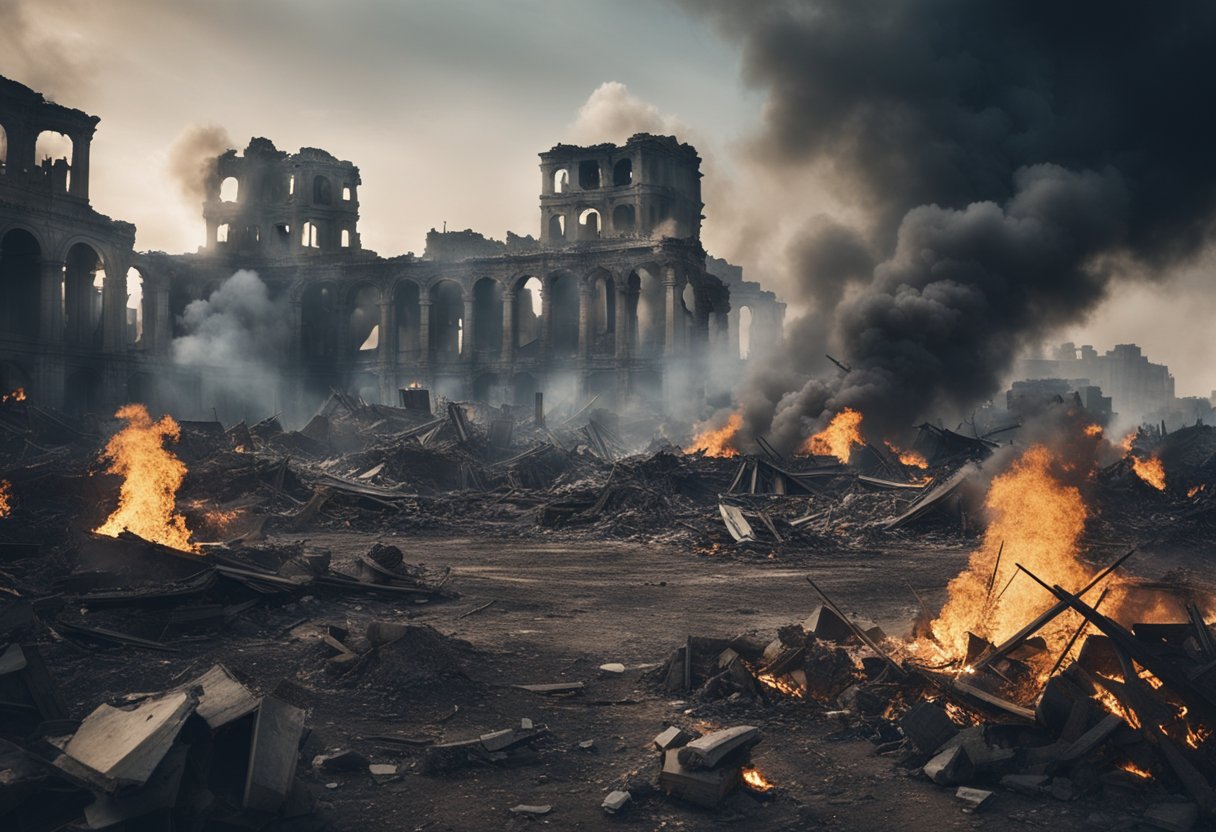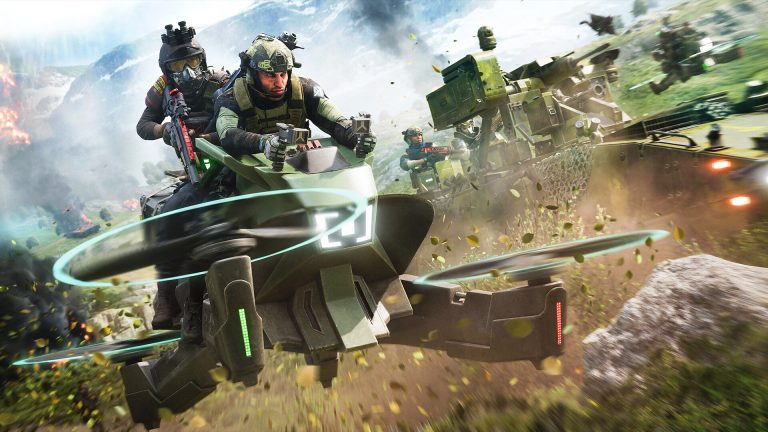Battlefield 2042 was met with significant anticipation upon its announcement, with EA and DICE promising an expansive, next-generation experience within the storied franchise. However, upon launch, the title saw an outpouring of reviews that were overwhelmingly negative. Players and critics alike cited numerous technical and design issues that detracted from the game’s potential. Major problems included poor PC optimization, unsatisfactory hit registration, and lackluster maps which failed to capture the essence of the large-scale warfare for which Battlefield is known.

The excitement leading up to the release of Battlefield 2042 gave way to disappointment, as the game was plagued with bugs and a lack of content right from the start. Issues with XP tracking in the 128-player game modes, along with reports of mastery ranks and cosmetic unlocks not functioning correctly, hampered the progression system. Gamers expressed their frustration, emphasizing that the game did not deliver the rich, polished experience expected from a major AAA title.
Despite DICE’s efforts to provide a revamped multiplayer experience, players found the reduced number of available maps and modes underwhelming when compared to previous entries in the series. With only ten maps and six modes available at launch, the content fell short of the breadth and depth that had been a hallmark of earlier Battlefield games. This scarcity of variety failed to satisfy long-time fans and newcomers to the franchise, resulting in the sentiment that Battlefield 2042 did not offer the value or quality coveted in a competitive multiplayer shooter.
Let’s try and explain why is Battlefield 2042 so bad.
Context and Expectations
The release of Battlefield 2042 was set against a rich franchise history, steep expectations, and inevitable comparisons to its successful predecessors, which framed the community’s collective mindset.
Battlefield Franchise History
The Battlefield series has long been lauded for its large-scale multiplayer combat, immersive environments, and robust class systems. Starting from “Battlefield 1942,” the franchise built its reputation on delivering intricate battle sequences and vehicular warfare. The community has been engaged and passionate, growing with each iteration. The franchise’s evolution was marked by notable releases such as “Battlefield Bad Company 2,” “Battlefield 3,” and the critically acclaimed “Battlefield 1,” which brought historical settings and innovative multiplayer design to the forefront.
Anticipation for Battlefield 2042
With the legacy of its predecessors, the anticipation for Battlefield 2042 was high. Players expected a game that would push the boundaries of next-gen consoles and PC gaming hardware, offering new experiences in line with the series’ potential for innovation. Teasers and promotions teased massive maps, advanced destruction physics, and a return to the all-out warfare that had become a signature for the franchise.
Comparisons to Previous Games
From the outset, Battlefield 2042 was subject to scrutiny as players compared every element to previous games in the series. These comparisons spanned a variety of features, including multiplayer modes, map design, the level of detail, and overall game mechanics. Predominantly, it was measured against games like “Battlefield 1,” which had set a high bar in terms of narrative integration, authenticity, and polished execution. “Battlefield 1” capitalized on the untapped potential of World War I, which resonated well with fans and critics alike, heightening expectations for the future titles in the series.
Technical Issues at Launch
Upon its release, Battlefield 2042 encountered a variety of technical difficulties that contributed to its challenging launch. Players experienced performance issues, and an array of glitches and bugs, which impacted the gameplay negatively.
Buggy Launch
The launch of Battlefield 2042 was marked by an assortment of technical problems. Reports from players indicated that there were frequent crashes and connectivity troubles which prevented many from enjoying the game. The community forums were quickly populated with threads discussing these issues, illustrating the game’s unstable release state.
Performance Problems
Performance in Battlefield 2042 was hindered by low frames per second (FPS) and stuttering, especially on PC. These issues were attributed to RAM and CPU optimization problems. Simple actions like restarting the game were sometimes a temporary fix, but more persistent performance issues required players to adjust settings or update their systems to mitigate the lag and improve game stability.
Glitches and Bugs
Players encountered various visual bugs and gameplay glitches which detracted from the gaming experience. From broken Specialist abilities to minor visual bugs, the issues were widespread. Even after subsequent patches, some problems persisted, suggesting that the game’s initial state had a significant influence on player reception and the title’s reputation.
Gameplay Criticisms
Battlefield 2042 has faced a variety of criticisms focused on its gameplay, raising concerns over the core mechanics, design choices, and game modes that collectively influence the player experience.
General Gameplay Concerns
Critiques of general gameplay in Battlefield 2042 stem from elements such as performance issues and server stability. Players have encountered inconsistent frame rates and lag, which severely impacts combat responsiveness against the enemy.
Map Design and Size
Maps in Battlefield 2042 have been noted for their enormous size. While large battlefields can add to the game’s scale, players find that this often leads to sparse encounters with the enemy, undermining the title’s signature action-packed sensation.
Balancing Issues
Weapon balance and class effectiveness have been debated among the community. Certain weapons are perceived as overwhelmingly superior, creating a stagnant meta that diminishes the diversity in gameplay styles and effectiveness across different combat situations.
Specialists System and Teamplay
Battlefield 2042 introduced a Specialists system, replacing the traditional class system. This change has been contentious, with arguments asserting that it detracts from teamplay. Players often focus on individual play rather than collaborative team strategies.
Game Modes Diversity
The variety and depth of game modes available have been points of contention. There is a feeling among players that the modes either feel too similar to one another or lack innovation, which fails to retain engagement over time.
Content and Features
Battlefield 2042’s content and features have been a point of contention among players, with criticism aimed at missing features and questionable decisions regarding monetization, as well as the underutilization of the game’s Portal mode.
Missing Standard Features
Players have noted the absence of a standard server browser, which has been a staple in past Battlefield titles. This impacts the ability to join community servers and find games with preferred settings. The lack of notable achievements and common functionalities that were present in older installments leaves a void in the user experience.
Monetization and Cosmetics
Monetization efforts are apparent with an emphasis on cosmetics, but these offerings have not been universally appreciated. The perceived focus on selling cosmetic items at the expense of gameplay quality and feature completeness has contributed to player dissatisfaction.
Portal Mode Potential
Portal Mode, a promising feature that allows players to create and share experiences by mixing elements from different Battlefield eras, has shown potential. However, this mode has arguably not been leveraged to its fullest, leading players to feel that a significant aspect of 2042’s appeal remains unexploited.
Delayed Updates and Roadmap
The delay in the release of Season One and several updates have hindered the game’s progression. Players are concerned about the future of Battlefield 2042 and whether it will fulfill its early access promises. The schedule slip for key improvements has only fueled uncertainty about the game’s roadmap.
Community and Industry Reaction
The release of Battlefield 2042 was met with stark criticism from both the gaming community and industry critics, leading to a wave of negative reviews and vocal feedback across various media platforms.
Initial Reception and Reviews
Upon its release, Battlefield 2042 was faced with considerable backlash. Review aggregator Metacritic shows a low score for the game, indicating a generally unfavorable reception from critics. The user score is even more telling, with an abundance of negative reviews emphasizing a myriad of issues haunting the game.
Comparative Performance on Media Platforms
The performances on media platforms like Steam reflect the community’s frustration, where the game has received “overwhelmingly negative” reviews recently. This contrasts sharply with the previous titles in the franchise, which generally garnered more positive feedback. On Reddit, players highlight the lack of basic teamplay features, such as spotting and squad orders, and criticize the game’s release without these essential elements.
Community Initiatives and Feedback
The community has taken to platforms such as Change.org to voice their concerns through petitions, demanding fixes and improvements. These initiatives showcase the active involvement of players in attempting to steer the game toward a better state. Feedback from the community frequently points to concerns over the game’s optimization for PC, hit registration issues, and the unsatisfactory design of maps which negatively affected the infantry gameplay experience.
Developer and Publisher Response
In the wake of Battlefield 2042’s problematic release, the response of the developers at DICE and the publisher Electronic Arts (EA) has been closely scrutinized by the gaming community. They have issued official statements, rolled out patches, and made promises regarding the game’s future.
Official Statements and Apologies
EA and DICE have acknowledged the issues with Battlefield 2042 and have issued formal apologies. The developers took to social media to express their awareness of the dissatisfaction among players. In several instances, they recognized that the game’s state during the holidays did not meet expectations, and the delayed communication further worsened the reception.
Patch Updates and Fixes
Following the backlash, DICE focused on providing patch updates and fixes to address the technical issues plaguing the game. A methodical approach has been taken to identify and rectify the myriad problems, from minor bugs to significant performance issues. Updates have been documented and shared with the community to ensure transparency.
| Patch Version | Release Date | Key Fixes |
|---|---|---|
| 1.0.x | Date | Bugs and Glitches |
| 1.1.x | Date | Performance Improvement |
| 1.2.x | Date | Balance Changes |
Future Promises and Damage Control
The developers and EA have been proactive in sharing their roadmap for the future of Battlefield 2042, which includes substantive updates and content expansions. There is a palpable emphasis on damage control, with assurances that player feedback is integral to shaping the game’s trajectory. Concerning refunds, they navigated within their established policies, while also being aware of the public’s call for more generous considerations.
- Content Roadmap
- New maps and modes
- Quality of life improvements
- Community Engagement
- Regular updates on progress
- Open forums for feedback
EA and DICE promise that the lessons learned from Battlefield 2042’s launch are being incorporated into future development to restore the franchise’s reputation.



0 Comments